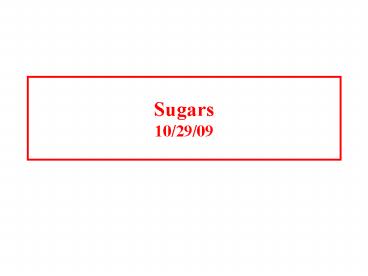Sugars 102909 - PowerPoint PPT Presentation
Title:
Sugars 102909
Description:
Carbohydrates or saccharides are essential components of living organisms. ... Cellulose and Chitin. Glycosaminoglycans. Proteoglycans ... – PowerPoint PPT presentation
Number of Views:61
Avg rating:3.0/5.0
Title: Sugars 102909
1
Sugars10/29/09
2
Carbohydrate and sugar structure
Carbohydrates or saccharides are essential
components of living organisms. (CH2O)n Where
n3 or greater. A single saccharide is called a
monosaccharide. Oligosaccharide is a few linked
monosaccharides and are at time associated with
proteins (glycoproteins) or lipids
(glycolipids) Polysaccharides consist of many
monosaccharides i.e. cellulose or glycogen
3
Monosaccharides (D-aldoses)
4
The Fischer convention, the basis for the D-
configuration in sugars comes from
D-glyceraldhydes configuration around its
asymmetric carbon. Note there are 2(n-2)
stereoisomers.
Epimers differ in configuration around one
carbon atom i.e. D-glucose and D-mannose but
D-galactose and D-mannose are not epimers as
they vary around two carbon atoms.
5
Monosaccharides (D-aldoses)
Epimers
Not Epimers
6
Carbohydrates are classified as to the nature of
the carbonyl group ketone ketose aldehyde
aldose
Triose Tetrose Pentose Hexose
2(n-3) stereoisomers of ketoses c.f.
2(n-2) stereoisomers of aldoses
7
Monosaccharides can form ring structures
Note that unlike condensation reactions there is
NO loss of a water molecule in these cyclization
reactions.
8
(No Transcript)
9
b-above plane
a-below plane
10
(No Transcript)
11
(No Transcript)
12
Glycosidic bonds are between two sugars
They can either be in the a or b configuration
and can be linked through the 1-2, 1-4 or 1-6
linkage
Note loss of water from condensation reaction
above.
13
Sugar Polymers The Polysacchrides
- Energy Storage
- Starch a-amylose and amypectin
- Structural
- Cellulose and Chitin
- Glycosaminoglycans
- Proteoglycans
14
a-amylose (starch) / Cellulose (poly b-glucose)
15
Glycosaminoglycans Proteoglycans
16
Bacteria Cell Walls
17
Peptidoglycan
18
Next LectureTuesday 11/03/09 Glycolysis I































